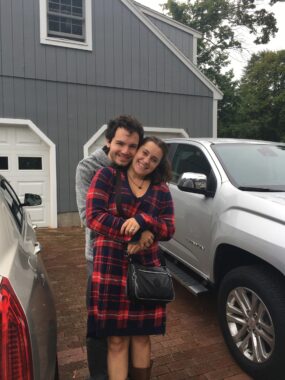Finding balance in my relationship with my caregiver and spouse
A columnist explains how Cushing's disease has affected their marriage
Written by |

Having a chronic illness is hard in so many ways. It’s hard on your body, it’s hard on your psyche, it’s hard on your life, and it’s hard on your caregiver. As much as I respect, trust, and love my caregiver for all he’s done for me, I have mixed feelings about needing one in the first place.
I was diagnosed with cyclic Cushing’s disease in 2020, but my symptoms began in 2018, when my partner, Peter, and I had only been together for two years.
The symptoms started slowly — loss of periods, mood shifts. These required adjustments, but not 24/7 care. Then, my disease started to really take over. I was overcome by fatigue, depression, muscle loss, bone issues, migraines, vision problems, and much more. At this point, without ever really discussing it, my partner became my caregiver.
That shift has been difficult for me to handle. An overwhelming sense of guilt eats at me. Am I taking away from the more “normal” life he could have had? I know he’s worried about me; what can I do to relieve that? How can I repay him for everything he’s done for me?

Peter and Noura in 2017, before Noura got sick. (Courtesy of Noura Costany)
My husband’s care
These days, there’s a bit more balance. For the most part, I can take care of myself. My husband helps me order my medications and makes sure I take them. He helps me when I need to use my wheelchair and require his assistance getting around. Sometimes I need his help standing, and he’s had to take care of me during my lows.
At my worst, my husband helped me live. I couldn’t work because I was too sick. In fact, I could barely function. I needed help showering and washing my hair. I needed someone to walk me everywhere in my apartment and prepare all my meals. There were also the months after my transsphenoidal surgery, when I needed him to watch me constantly in case I had an adrenal crisis.
On top of all the physical support, Peter has also provided emotional support. He’s my partner, the person I go to when a doctor’s appointment ends badly, the person I cry to when I’m in pain, the person I lean on when I lose hope. I’ve had to rely on him so wholeheartedly that, at times, I feared I would cease to exist without him.
The guilt
I used to let my guilt consume me, and I’d go too far in trying to even out the playing field. I would surprise my husband by cleaning the entire apartment, but I would push my body too hard, collapse on the ground, and find myself in a pool of my own vomit. I would spend hours making him the perfect dinner from scratch, only to get a terrible migraine and need to sit in the dark for hours, leaving him to enjoy the dinner on his own.
I felt like I owed him, like I needed to show my love for him in the same deeply romantic and personal ways he had for me. Peter had helped me bathe — how could I match that? He made me meals for months after my surgery, so I felt I had to make food for him constantly. Equal.
But we’re not equals. I have a chronic illness, and my husband doesn’t. The amount of energy I have is not equal to the energy he has. Our physical capabilities are very different.
Acceptance
At first, the idea that we were unequal destroyed me. I thought our relationship would always be unbalanced. Eventually, though, I realized that I have skills my husband doesn’t. When Peter has a bad day, I’m a master at making him feel better. I’m an awesome gift giver. I motivate and push my husband to be the best version of himself — something he can’t do on his own.
Our relationship will never be equal. There will be days when I do more, and days when he does more. We will take turns being there for each other and needing things from each other. But, no matter what, our relationship will be full of love. At the end of the day, you can’t measure, judge, or repay love. It’s constant.
How is your relationship with your caregiver? Please comment below and tell me about it! You can also follow my journey on TikTok and YouTube.
Note: Cushing’s Disease News is strictly a news and information website about the disease. It does not provide medical advice, diagnosis, or treatment. This content is not intended to be a substitute for professional medical advice, diagnosis, or treatment. Always seek the advice of your physician or other qualified health provider with any questions you may have regarding a medical condition. Never disregard professional medical advice or delay in seeking it because of something you have read on this website. The opinions expressed in this column are not those of Cushing’s Disease News or its parent company, Bionews, and are intended to spark discussion about issues pertaining to Cushing’s.







Leave a comment
Fill in the required fields to post. Your email address will not be published.